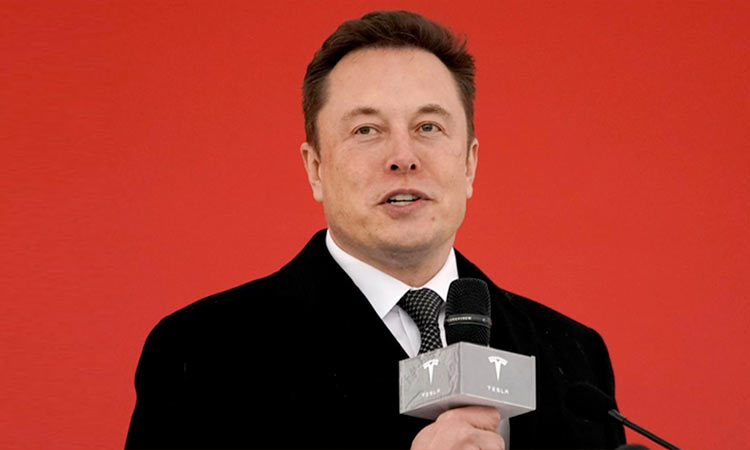
Tesla Inc on Friday posted record vehicle deliveries for the second quarter that were in line with Wall Street estimates as the electric-car maker coped with a shortage of chips and relied on sales of its cheaper models.
Tesla weathered the global supply crisis better than legacy automakers, but CEO Elon Musk has warned of challenges of securing chips and raw materials.
Now eyes are on its second-quarter earnings to see whether recent drops in bitcoin prices would have an adverse affect on Tesla’s bottom line, due to Tesla’s exposure to the cryptocurrency’s volatility.
Tesla delivered 201,250 vehicles in total during the second quarter. Analysts had expected Tesla to deliver 200,258 vehicles, according to Refinitiv data.
“It was a solid quarter to volume wise, but I view it as a modest disappointment,” Garrett Nelson, an equity analyst at CFRA Research, said.
Shares of the company were traded flat, after rising as much as 3.3% in early trading on Friday.
Tesla bulls cheered the results. “This morning the Street was bracing for bad news and the bulls instead got an early July 4th weekend positive surprise,” said Dan Ives, an analyst at Wedbush Securities.
“Our teams have done an outstanding job navigating through global supply chain and logistics challenges,” Tesla said.
The numbers showed that strong deliveries of its Model 3 sedans and Model Y crossovers, its two lower priced variants, offset a drop in deliveries of higher-end Model S and X variants.

Tesla has been raising prices for its vehicles in recent months, which its billionaire boss, Elon Musk, blamed in May on “major supply chain price pressure”, especially raw materials.
He also said in early June that “Our biggest challenge is supply chain, especially microcontroller chips. Never seen anything like it.”
Brokerage RBC said, “Worst may be over for Tesla” for chip shortage, but added that potential margin impact from broad supply chain tightness could persist through the year.
Tesla generated 99% of its sales in Model 3 and Model Y, as its new version Model S was launched only in June after several delays.
Overall deliveries of its higher priced Model S and X cars fell to 1,890 during the April to June period, from a meager 2,020 the preceding quarter, Tesla said.
A Tesla Model S Plaid electric vehicle with a price tag of $129,990, burst into flames on Tuesday while the owner was driving, just three days after the car was delivered. Tesla did not have an immediate comment when contacted by Reuters.
Tesla sold 21,936 Model 3 and Model Y cars to Chinese customers in May, rebounding from a sales slump in April, but still well below March numbers. Its China sales for June will be released in the coming days.
In China, a major growth market for Tesla, the company is facing rising competition from local EV companies as well as heightened scrutiny from regulators and the public.
Chinese regulators said last week Tesla would ‘recall’ nearly 300,000 China-made and imported Model 3 and Model Y cars for an online software update related to assisted driving.
Sharp drops in bitcoin prices also could weigh down on Tesla’s second-quarter earnings, analysts say.
On Feb. 8, Tesla disclosed its bitcoin investment of $1.5 billion. Its bitcoin holdings helped generate profits in the first quarter, through the sale of 10% of them.
But the investment is also exposing Tesla stocks to the volatile cryptocurrency prices, which suffered from recent falls.
“Tesla stock price has been pretty closely correlating with the price of bitcoin,” Nelson said, adding this hurts investor sentiment despite bitcoin accounting for a small portion of Tesla’s overall cash.
Its biggest act may have been beamed in on a screen, but a smaller, quieter ‘hybrid’ Mobile World Congress (MWC) has given others hope that in-person events can succeed in a pandemic.
For those who did make it to Barcelona, there were no boozy parties, with far fewer such gatherings than in previous years and the only alcohol on offer reserved for hand sanitising.
The must-haves at this week’s MWC were a negative COVID-19 test, an FFP2 face mask and a digital contact-tracing badge for the 30,000 or so who filed through its testing stations and followed a one-way traffic system to reduce infection risk.
At every booth an army of volunteers religiously scanned contact tracing passes, while others were on hand at every corner reminding visitors who were not maintaining enough distance or whose face mask had slipped to follow the rules.
The events industry, which includes conferences and performances and was valued at $1.14 trillion in 2019 by Allied Market Research, was stopped in its tracks by the pandemic.












